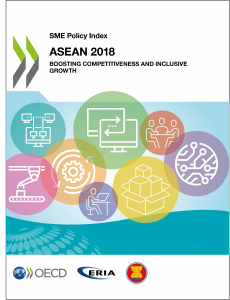
The Organisation for Economic Cooperation and Development (OECD) in cooperation with the Economic Research Institute for ASEAN & East Asia (ERIA) and the Association of Southeast Asian Nations (ASEAN) have developed an ASEAN SME PolicyIndex 2018.
This report looks at the policy landscape for SME development across ASEAN, identifying potential gaps and offering recommendations going forward. It is based on an assessment of the scope and intensity of policies across eight thematic areas. The ten ASEAN countries are scored on a comprehensive set of qualitative and quantitative indicators. This methodology builds on the OECD’s SME Policy Index methodology, which has been applied in various regions, including ASEAN in 2014. It integrates the goals of the ASEAN Strategic Action Plan for SME Development (SAP SMED) 2016-2025. The assessment was conducted by the OECD and ERIA at both the regional and country levels, and was carried out in co-operation with the ASEAN Coordinating Committee on Micro, Small and Medium Enterprises (ACCMSME) and national policy makers, as well as academic experts and the private sector. This report was endorsed at the 50th Meeting of the ASEAN Economic Ministers (AEM) as a reference tool to help monitor and evaluate ASEAN’s efforts in advancing MSME development policies.
The report finds that most ASEAN countries are active in the area of SME policy and apply a mix of horizontal and targeted approaches. On the horizontal side, they tend to prioritise measures to cut red tape and streamline business registration. On the targeted side, they tend to focus on measures to enhance productivity and increase access to finance. The intensity and extent of policy intervention varies greatly among countries, and this correlates with the overall level of institutional development. Indonesia, Malaysia, Singapore, the Philippines and Thailand have invested significantly in business development services, an area that Brunei Darussalam and Viet Nam are increasingly exploring, while Cambodia, Lao PDR and Myanmar have focused more on improving the legal and regulatory environment for SMEs and building institutions for SME policy. ASEAN countries are very active in the area of market access and internationalisation, and this is where most regional co-operation on SME policy takes place. Finally, while the social contribution of SMEs is an important consideration for most policy makers, relatively few interventions take place in the areas of SME greening and inclusion.
To read the full report please check out this link: https://eccil.org/euro-lao-business/asean-and-aec/asean-sme-policy-index/.





